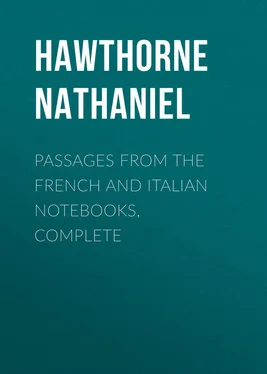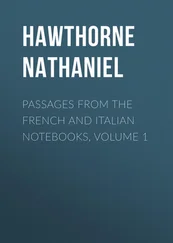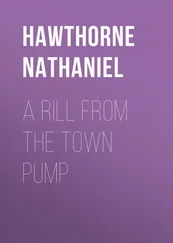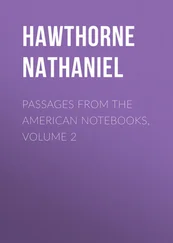Nathaniel Hawthorne - Passages from the French and Italian Notebooks, Complete
Здесь есть возможность читать онлайн «Nathaniel Hawthorne - Passages from the French and Italian Notebooks, Complete» — ознакомительный отрывок электронной книги совершенно бесплатно, а после прочтения отрывка купить полную версию. В некоторых случаях можно слушать аудио, скачать через торрент в формате fb2 и присутствует краткое содержание. Жанр: literature_19, foreign_antique, foreign_prose, на английском языке. Описание произведения, (предисловие) а так же отзывы посетителей доступны на портале библиотеки ЛибКат.
- Название:Passages from the French and Italian Notebooks, Complete
- Автор:
- Жанр:
- Год:неизвестен
- ISBN:нет данных
- Рейтинг книги:5 / 5. Голосов: 1
-
Избранное:Добавить в избранное
- Отзывы:
-
Ваша оценка:
- 100
- 1
- 2
- 3
- 4
- 5
Passages from the French and Italian Notebooks, Complete: краткое содержание, описание и аннотация
Предлагаем к чтению аннотацию, описание, краткое содержание или предисловие (зависит от того, что написал сам автор книги «Passages from the French and Italian Notebooks, Complete»). Если вы не нашли необходимую информацию о книге — напишите в комментариях, мы постараемся отыскать её.
Passages from the French and Italian Notebooks, Complete — читать онлайн ознакомительный отрывок
Ниже представлен текст книги, разбитый по страницам. Система сохранения места последней прочитанной страницы, позволяет с удобством читать онлайн бесплатно книгу «Passages from the French and Italian Notebooks, Complete», без необходимости каждый раз заново искать на чём Вы остановились. Поставьте закладку, и сможете в любой момент перейти на страницу, на которой закончили чтение.
Интервал:
Закладка:
The interior loftiness of Notre Dame, moreover, gives it a sublimity which would swallow up anything that might look gewgawy in its ornamentation, were we to consider it window by window, or pillar by pillar. It is an advantage of these vast edifices, rising over us and spreading about us in such a firmamental way, that we cannot spoil them by any pettiness of our own, but that they receive (or absorb) our pettiness into their own immensity. Every little fantasy finds its place and propriety in them, like a flower on the earth's broad bosom.
When we emerged from the cathedral, we found it beginning to rain or snow, or both; and, as we had dismissed our fiacre at the door, and could find no other, we were at a loss what to do. We stood a few moments on the steps of the Hotel Dieu, looking up at the front of Notre Dame, with its twin towers, and its three deep-pointed arches, piercing through a great thickness of stone, and throwing a cavern-like gloom around these entrances. The front is very rich. Though so huge, and all of gray stone, it is carved and fretted with statues and innumerable devices, as cunningly as any ivory casket in which relics are kept; but its size did not so much impress me…
Hotel de Louvre, January 12th. – This has been a bright day as regards weather; but I have done little or nothing worth recording. After breakfast, I set out in quest of the consul, and found him up a court, at 51 Rue Caumartin, in an office rather smaller, I think, than mine at Liverpool; but, to say the truth, a little better furnished. I was received in the outer apartment by an elderly, brisk-looking man, in whose air, respectful and subservient, and yet with a kind of authority in it, I recognized the vice-consul. He introduced me to Mr. – , who sat writing in an inner room; a very gentlemanly, courteous, cool man of the world, whom I should take to be an excellent person for consul at Paris. He tells me that he has resided here some years, although his occupancy of the consulate dates only from November last. Consulting him respecting my passport, he gave me what appear good reasons why I should get all the necessary vises here; for example, that the vise of a minister carries more weight than that of a consul; and especially that an Austrian consul will never vise a passport unless he sees his minister's name upon it. Mr. – has travelled much in Italy, and ought to be able to give me sound advice. His opinion was, that at this season of the year I had better go by steamer to Civita Veechia, instead of landing at Leghorn, and thence journeying to Rome. On this point I shall decide when the time comes. As I left the office the vice-consul informed me that there was a charge of five francs and some sous for the consul's vise, a tax which surprised me, – the whole business of passports having been taken from consuls before I quitted office, and the consular fee having been annulled even earlier. However, no doubt Mr. – had a fair claim to my five francs; but, really, it is not half so pleasant to pay a consular fee as it used to be to receive it.
Afterwards I walked to Notre Dame, the rich front of which I viewed with more attention than yesterday. There are whole histories, carved in stone figures, within the vaulted arches of the three entrances in this west front, and twelve apostles in a row above, and as much other sculpture as would take a month to see. We then walked quite round it, but I had no sense of immensity from it, not even that of great height, as from many of the cathedrals in England. It stands very near the Seine; indeed, if I mistake not, it is on an island formed by two branches of the river. Behind it, is what seems to be a small public ground (or garden, if a space entirely denuded of grass or other green thing, except a few trees, can be called so), with benches, and a monument in the midst. This quarter of the city looks old, and appears to be inhabited by poor people, and to be busied about small and petty affairs; the most picturesque business that I saw being that of the old woman who sells crucifixes of pearl and of wood at the cathedral door. We bought two of these yesterday.
I must again speak of the horrible muddiness, not only of this part of the city, but of all Paris, so far as I have traversed it to-day. My ways, since I came to Europe, have often lain through nastiness, but I never before saw a pavement so universally overspread with mud-padding as that of Paris. It is difficult to imagine where so much filth can come from.
After dinner I walked through the gardens of the Tuileries; but as dusk was coming on, and as I was afraid of being shut up within the iron railing, I did not have time to examine them particularly. There are wide, intersecting walks, fountains, broad basins, and many statues; but almost the whole surface of the gardens is barren earth, instead of the verdure that would beautify an English pleasure-ground of this sort. In the summer it has doubtless an agreeable shade; but at this season the naked branches look meagre, and sprout from slender trunks. Like the trees in the Champs Elysees, those, I presume, in the gardens of the Tuileries need renewing every few years. The same is true of the human race, – families becoming extinct after a generation or two of residence in Paris. Nothing really thrives here; man and vegetables have but an artificial life, like flowers stuck in a little mould, but never taking root. I am quite tired of Paris, and long for a home more than ever.
MARSEILLES
Hotel d'Angleterre, January 15th. – On Tuesday morning, (12th) we took our departure from the Hotel de Louvre. It is a most excellent and perfectly ordered hotel, and I have not seen a more magnificent hall, in any palace, than the dining-saloon, with its profuse gilding, and its ceiling, painted in compartments; so that when the chandeliers are all alight, it looks a fit place for princes to banquet in, and not very fit for the few Americans whom I saw scattered at its long tables.
By the by, as we drove to the railway, we passed through the public square, where the Bastille formerly stood; and in the centre of it now stands a column, surmounted by a golden figure of Mercury (I think), which seems to be just on the point of casting itself from a gilt ball into the air. This statue is so buoyant, that the spectator feels quite willing to trust it to the viewless element, being as sure that it would be borne up as that a bird would fly.
Our first day's journey was wholly without interest, through a country entirely flat, and looking wretchedly brown and barren. There were rows of trees, very slender, very prim and formal; there was ice wherever there happened to be any water to form it; there were occasional villages, compact little streets, or masses of stone or plastered cottages, very dirty and with gable ends and earthen roofs; and a succession of this same landscape was all that we saw, whenever we rubbed away the congelation of our breath from the carriage windows. Thus we rode on, all day long, from eleven o'clock, with hardly a five minutes' stop, till long after dark, when we came to Dijon, where there was a halt of twenty-five minutes for dinner. Then we set forth again, and rumbled forward, through cold and darkness without, until we reached Lyons at about ten o'clock. We left our luggage at the railway station, and took an omnibus for the Hotel de Provence, which we chose at a venture, among a score of other hotels.
As this hotel was a little off the direct route of the omnibus, the driver set us down at the corner of a street, and pointed to some lights, which he said designated the Hotel do Provence; and thither we proceeded, all seven of us, taking along a few carpet-bags and shawls, our equipage for the night. The porter of the hotel met us near its doorway, and ushered us through an arch, into the inner quadrangle, and then up some old and worn steps, – very broad, and appearing to be the principal staircase. At the first landing-place, an old woman and a waiter or two received us; and we went up two or three more flights of the same broad and worn stone staircases. What we could see of the house looked very old, and had the musty odor with which I first became acquainted at Chester.
Читать дальшеИнтервал:
Закладка:
Похожие книги на «Passages from the French and Italian Notebooks, Complete»
Представляем Вашему вниманию похожие книги на «Passages from the French and Italian Notebooks, Complete» списком для выбора. Мы отобрали схожую по названию и смыслу литературу в надежде предоставить читателям больше вариантов отыскать новые, интересные, ещё непрочитанные произведения.
Обсуждение, отзывы о книге «Passages from the French and Italian Notebooks, Complete» и просто собственные мнения читателей. Оставьте ваши комментарии, напишите, что Вы думаете о произведении, его смысле или главных героях. Укажите что конкретно понравилось, а что нет, и почему Вы так считаете.












